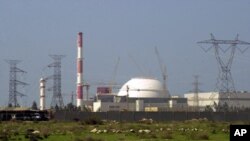U.S. President Barack Obama has urged Russian and Chinese leaders to support his efforts to pressure Iran to stop its sensitive nuclear activities, but he faced criticism from Republican presidential contenders at home who called for tougher U.S. action on the nuclear dispute.
Mr. Obama says he discussed the Iranian nuclear program in separate meetings with Russian President Dmitry Medvedev and Chinese President Hu Jintao Saturday on the sidelines of a regional summit in Honolulu, Hawaii.
After meeting Mr. Medvedev, Mr. Obama said he and the Russian president reaffirmed their intention to shape a "common response" to Iranian nuclear activities that will "move Iran" to follow its international obligations. Before talking with Mr. Hu, the U.S. president said he and the Chinese leader want to ensure that Iran abides by "international rules and norms."
Western powers have warned that Iran faces more sanctions if it fails to address their concerns about a U.N. nuclear agency report released Tuesday that found "credible" evidence of Iranian efforts to design a nuclear weapon. Iran rejected the report and insisted its nuclear program is peaceful. Russia and China said additional U.N. sanctions on Iran will not resolve the nuclear dispute.
After Saturday's talks in Honolulu, the Russian and Chinese presidents gave no details of their discussions with Mr Obama on Iran. But, U.S. deputy national security adviser Ben Rhodes said all three leaders were united in their opposition to Iran becoming a nuclear-armed nation.
Mr. Obama has tried to increase pressure on Iran through the United Nations and unilateral U.S. sanctions, while insisting that "all options" remain on the table, a reference to possible military action. Republicans seeking to challenge him for the presidency next year criticized that strategy in a nationally-televised debate Saturday, with some saying they would take stronger measures to prevent a nuclear-armed Iran, even going to war.
Former Massachusetts governor Mitt Romney said he would take military action if other measures failed. Romney said that if he is elected president, Iran "will not have a nuclear weapon," while predicting that Iran will become nuclear-armed if Mr. Obama wins a second term.
Another Republican hopeful, U.S. House of Representatives Intelligence Committee member Michele Bachmann, accused Iran of working with Syria and militant groups such as Hamas to prepare for a "worldwide nuclear war against Israel."
Israel sees a nuclear-armed Iran as a threat to its existence, in part due to frequent Iranian calls for the destruction of the Jewish state. Israel also is widely-believed to be the only Middle East nation with a nuclear arsenal.
Business executive and presidential candidate Herman Cain told the debate that the only way to stop Iran from gaining nuclear weapons is through economic sanctions and support for Iranian opposition groups. But Republican candidate and House member Ron Paul said going to war against Iran is "not worthwhile."
Some information for this report provided by AP, AFP and Reuters.
